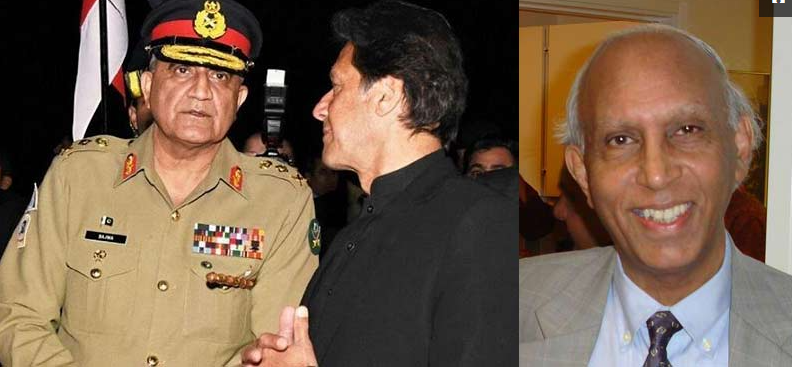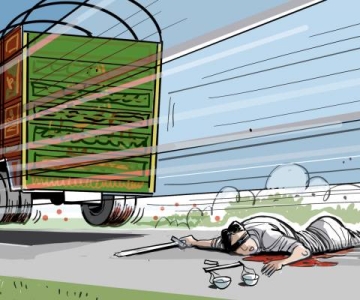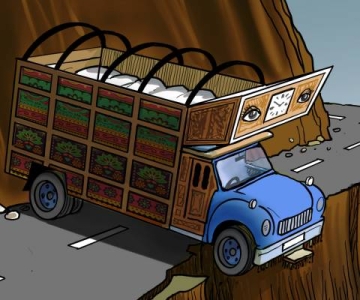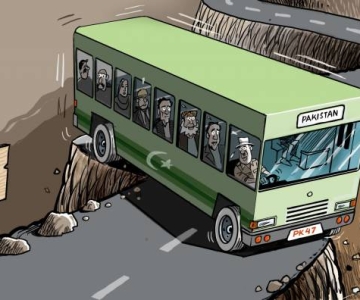Dr. Ishtiaq Ahmed is a leading Pakistani political scientist and commentator. His important work Pakistan: The Garrison State—Origins, Evolution, Consequences (1947-2011) traces the role and influence of Pakistan’s armed forces on the nation’s polity and governance. Given the recent political events, Raza Rumi interviewed Dr Ahmed about the central thesis of his book and how could it help us understand the current political scenario.
RR: How do you think your Garrison state thesis on Pakistan is playing out currently?
IA: The Garrison State thesis has stood the test of time and remains the framework through which the ideological nature of the state and its politics can be understood in a holistic manner. The thesis argued that because of the fear of foreign aggression the specialists on violence, the men in khaki, assume the role of the guardians of national survival. They capture key sectors of the society: economic, educational, ideological and cultural on grounds of competence.
That is exactly how Pakistan evolved after independence. The political class was notoriously inept and incompetent and the leadership made a mockery of democracy and democratic institutions.
The perceived external existentialist threat posed by a bigger and better armed India and the incompetence of civilian rule paved the way for the military to capture power formally in 1958 though already from 1954 it was represented in the federal cabinet.
I added to the Garrison State model Hamza Alavi’s notion of postcolonial state with the important difference that I argued that Pakistan’s post-coloniality was not primarily economic as Alavi argued but political, or rather geo-strategically political.Given the Cold War was raging at that time, Pakistan acquired arms and training by lobbying with the Americans that it would serve as a frontline state in the containment of the Soviet Union. It was a clever move to arm itself vis-a-vis India – something the Americans realized by 1959.
However, finally Pakistan was placed in the frontline state during the so-called Afghan jihad. A major gain was the successful development of nuclear weapon capability.
The cumulative impact of internal and external politics was that when civilian rule was revived in 1988, the military had grown too powerful and set the ideological agenda freely: it acquired de facto veto powers over Pakistan’s internal and external affairs.
RR: And what about the present….?
IA: That situation remains unchanged at present even when an assertive Imran Khan is now prime minister and the external donors have with the exception of China pulled back their support in the form of military and economic aid. There is no doubt that the military favoured a change of government and that enabled Imran Khan to be elected as prime minister. I am not suggesting that Nawaz Sharif government represented a democratic alternative. His was a corrupt government whose exit we have no reason to mourn but Sharif would not have gone were the military to continue supporting him.
However, the international scenario has changed. The Cold War is over; the Americans are no longer patronizing Pakistan; the Russians are courting Pakistan; Saudi Arabia is turning more inwards and does not rely on Pakistani compliance to its whims, as was the case in the past. China is now our main benefactor. Given its massive investments in Pakistan it would want Pakistan to fall in line with its grand development plan, which includes India as a partner in it.
However, with a bellicose Hindu nationalist government in power in India, which is willing to flex its muscles and has turned down peace overtures from Imran Khan the garrison state continues to enjoy prestige and clout.
Under the circumstances, another league of life for the post-colonial garrison state is assured but in the long run it will become increasingly untenable. Pakistan will have to agree to the Line of Control becoming the international border with India if ever some sort of normality in the sense of civilian supremacy over Pakistani politics is to be established.
RR – In such scenario, what role do you foresee for PMs like Imran Khan?
IA: I think Imran Khan does represent the aspirations of Pakistanis to establish a clean government but whereas he has not relented in hounding up those who allegedly have abused public office to amass staggering fortunes like all other politicians he is in no position to hold the military and its top brass accountable for their role in perpetuating the regime of corruption that has notoriously afflicted Pakistan. The way I understand, he better move cautiously and in partnership with the military otherwise he too can be shown the door.
RR: How do you link your thesis with the current chatter for a Presidential System?
IA: An interesting question. I am not averse to the presidential system of government but if it means that the 18th Amendment would be repealed and a centralized system again takes over, the grievances of the provinces will only weaken Pakistan. On the other hand, I think the 18th Amendment can be modified to place education with the centre because during my winter stints at GCU I met many Sindhi students who told me that the schools and colleges are very poorly run by the PPP government. I think the situation is no better in Balochistan.
Unless the power of the Sindhi landlords and Baloch sardars is broken and their social and economic privileges taken away the people of those provinces will always be at the mercy of their native masters. An ambitious, compulsory educational system enjoying the full and determined support of the centre can play a decisive role in steering the social structure and culture of Pakistan into an egalitarian and progressive direction.
On the other hand, the provinces should continue to enjoy a fair share of national budget as agreed. It is important to decentralize and continue with devolution of power to local government.
RR: What is your view on the recent change in policy towards India, keeping in view your thesis on Garrison or Praetorian State?
IA: I have always wondered if there is a curse hanging over the destiny of South Asia. Pakistan and India hold the destiny of this region hostage to their conflicts. When India has been ready to make concessions Pakistan has spurned those overtures and when Pakistan has shown willingness to compromise India has been dismissive of it. Currently, Pakistan’s stance is far better than that of India under Modi.
I am not sure if Modi returns to power Pakistan would be in a better position to negotiate a peace deal with India as Imran Khan has suggested because once the poison of communalism becomes national ideology states simply cannot make rational and enlightened decisions. Pakistan went down that path much earlier than India but now India under Modi is making the two-nation theory argument sound like wisdom although in my opinion it has been the most vitiating ideology which has come to haunt Pakistan and which is now taking a firm grip over India. Regarding Pakistan, a Hindutva based India is the best guarantee that Pakistan will remain a garrison state.
RR: Do you think the army might be shifting from previously held positions on a security state?
IA: I think the army realizes that its ability to perpetuate the garrison state/security state in terms of non-state actors using Pakistan as a base to launch their jihads in the Indian-administered Kashmir and elsewhere will provoke a war it may not be able to win. It may therefore be willing to seek a negotiated settlement with India but which will have to be in terms of the Line of Control being accepted as the international border and the Kasuri Plan then serving as the framework for the gradual conversion of borders into legal but symbolic demarcations. Unless that happens I see no reason why India would want to let go Kashmir where it is the upper riparian and militarily well-entrenched.
On the other hand, the arrest of Khadim Hussain Rizvi and his ilk proves that such forces representing militant Islam are easily controllable and the army better learn a lesson from its patronage of such medieval and obscurantist elements. Given a free hand they do not hesitate to bite the hand which feeds them.
RR: Do you see the nature of Pakistani state shifting anytime soon?
IA: I think the international and regional environment can ultimately compel Pakistan to conform to the norm of civilian supremacy because the days of jihad, even one as absurd as one sponsored by Western powers, are over.
However, the international and regional situation is in a flux and it would be premature to read too much in the changes, which are underway in world politics.



